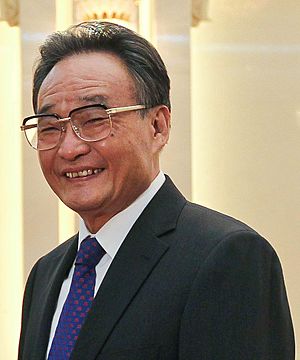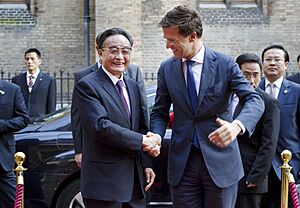Wu Bangguo facts for kids
Quick facts for kids
Wu Bangguo
|
|
|---|---|
| 吴邦国 | |

Wu in 2011
|
|
| 8th Chairman of the Standing Committee of the National People's Congress | |
| In office 15 March 2003 – 14 March 2013 |
|
| Deputy | Wang Zhaoguo |
| Preceded by | Li Peng |
| Succeeded by | Zhang Dejiang |
| Vice Premier of China | |
| In office 18 March 1995 – 16 March 2003 |
|
| Premier | Li Peng Zhu Rongji |
| Communist Party Secretary of Shanghai | |
| In office 20 March 1991 – 28 September 1994 |
|
| Deputy | Huang Ju (Mayor) |
| Preceded by | Zhu Rongji |
| Succeeded by | Huang Ju |
| Personal details | |
| Born | July 1941 Pingba, Guizhou, China |
| Died | 8 October 2024 (aged 83) Beijing, China |
| Political party | Chinese Communist Party |
| Spouse | Zhang Ruizhen |
| Alma mater | Tsinghua University |
| Occupation | Electronics engineer |
| Wu Bangguo | |||||||
|---|---|---|---|---|---|---|---|
| Simplified Chinese | 吴邦国 | ||||||
| Traditional Chinese | 吳邦國 | ||||||
|
|||||||
Wu Bangguo (born July 1941 – died October 8, 2024) was an important Chinese politician. He held very high positions in China's government for many years. From 2002 to 2012, he was the second-highest-ranking member of the Politburo Standing Committee of the Chinese Communist Party. This is a small group of top leaders in China. He also served as the Chairman of the Standing Committee of the National People's Congress from 2003 to 2013. This role is like the head of China's parliament.
Wu was trained as an electrical engineer. He became well-known in politics while working in Shanghai. He worked with Jiang Zemin, who later became a top leader. Wu was part of a group of politicians sometimes called the 'Shanghai clique'. He became a Vice Premier of China in 1995. Later, he became the Chairman of the National People's Congress. He was known for his more traditional views on political changes.
Contents
Early Life and Education
Wu Bangguo was born in Pingba, Guizhou province, China. His family originally came from Feidong in Anhui province. His father, Wu Zhongxing, worked as a cartographer, which means he made maps.
In 1960, Wu started studying at Tsinghua University. He chose to major in electron tube engineering. He graduated from the Department of Radio Electronics in 1967. He joined the Chinese Communist Party (CCP) in 1964.
After finishing university, Wu worked at Shanghai's No. 3 Electronic Tube Factory. He started as a worker and technician. Later, he became a deputy chief and then chief of the technical section. He eventually became the party secretary, leading the factory. In 1978, he was made the deputy manager of Shanghai Electronic Elements Company. He also worked as deputy manager of Shanghai Electron Tube Company. From 1981 to 1983, he was the deputy secretary of Shanghai Meters, Instruments and Telecommunications Bureau.
Rise in Political Career
Wu's experience in electronics companies helped him move into higher political roles in Shanghai. In 1983, he became part of the Standing Committee of the Shanghai party committee. This made him part of Shanghai's important political group. He was put in charge of science and technology work.
During this time, he worked closely with Jiang Zemin. Jiang Zemin was the mayor of Shanghai and later became the city's top leader, the CCP secretary. From 1985 to 1991, Wu became the CCP deputy secretary of Shanghai. After that, he became the CCP secretary of Shanghai, taking over from Jiang Zemin. While he was in Shanghai, he played a key role in developing the Pudong New Area. This area became a very important economic zone.
As Shanghai's economy grew, Wu gained more power. In 1992, he earned a seat on the Politburo of the Chinese Communist Party. This is China's main ruling council. In 1995, he was appointed as the third-ranking Vice Premier of China. He worked under Premier Li Peng. In this role, he was in charge of industry and changing state-owned companies. He also helped oversee the building of the massive Three Gorges Dam. He continued as vice premier under Zhu Rongji until 2003.
Chairman of the National People's Congress
In November 2002, at the 16th National Congress of the Chinese Communist Party, Wu Bangguo joined the highest level of power in China. He became the second-ranking member of the Politburo Standing Committee of the Chinese Communist Party. Only Hu Jintao, the general secretary, was ranked higher.
In 2003, he was appointed as the chairman of the Standing Committee of the National People's Congress. This is the head of China's national legislature. He was re-elected to this position in March 2008.
During his time as chairman, Wu was seen as a member of the Shanghai clique. This group was associated with Jiang Zemin. Wu generally held traditional views on political changes. He was also known for keeping a low profile in his role.

In June 2007, Wu gave a speech in Hong Kong about the Hong Kong Basic Law. He said that Hong Kong's power comes from Beijing. He also stated that Hong Kong's government should not just copy Western systems. He mentioned that the central government supported Hong Kong's democracy, but only within the rules of the Basic Law. These comments caused some discussion in Hong Kong.
Each year, Wu gave a speech at the National People's Congress sessions in March. In these speeches, he always said that China would not adopt certain Western political ideas. For example, he said China would not have a system with many political parties, or a system where power is divided into separate branches, or a federal system. In 2011, he clearly stated that China would not use systems like "multiple parties holding office in rotation" or "separation of powers."
On July 16, 2012, Wu attended the launch of the Shenzhou 9 crewed spacecraft. This was a significant event for China's space program.
Wu retired from the CCP Politburo Standing Committee in November 2012. Zhang Dejiang took over his role as NPCSC chairman in March 2013. In his final speech as chairman, Wu repeated that China would "absolutely not copy models in the Western political system."
After Retirement
Like other top officials who retire in China, Wu Bangguo stopped making many public appearances. He would only attend important national events, such as the National Day of the People's Republic of China celebration. In March 2015, a picture showed Wu visiting a rapeseed farm in Wuyuan, Jiangxi province.
Wu Bangguo passed away on October 8, 2024, at the age of 83.
See also
- Shanghai clique
- 16th Politburo Standing Committee of the Chinese Communist Party
 In Spanish: Wu Bangguo para niños
In Spanish: Wu Bangguo para niños
 | Dorothy Vaughan |
 | Charles Henry Turner |
 | Hildrus Poindexter |
 | Henry Cecil McBay |

